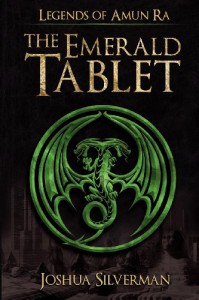77
Followers
22
Following
YA Novelties
We're just four ordinary teenagers, Angie, Jenny, Rosie, and ~M, that have have nothing better to do than read.
Review: The Emerald Tablet by Joshua Silverman

I was asked to read this book by the author in exchange for an honest review.
Usually when a novel that sounds so all gung-ho on having some boy who still hasn't reached puberty to be the savior of the world, I'm prepared for a cliched, yet realistic middle grade that has the kid being the star of some bleh prophecy. Yes, that is exactly what happened with this book, yet the differences outweigh the similarities on many accounts. Mixing Egyptian and Greek mythology is the selling point that it totally kicks butt in.
The intriguing storytelling that The Emerald Tablet uses is one that consists of multiple points of the views that serve to cover all of the multiple adventures going on at once. A majority of the time, the multiple points of views becomes hectic and extremely irritating, but this time around, each situation was told from a third person view that incorporated all of the present characters. That is also extremely confusing at times when it switches from a guy thinking about conquering the world, and switches to his lover mooning over him. Trust me, it happens quite often. There is nothing necessarily wrong with it, it just took some time to get used to. However, once one overcomes the awkward third-person narration, the story flows beautifully. In fact, the novel probably could not be told in any other way besides the flip-flopping third-person method that it utilizes.
While reading The Emerald Tablet because so many characters are having their thoughts be revealed, it seems as if one would could easily relate to most of the characters. That is not how it exactly went. Most characters were only given a pitiful few pages of having the situation be interpreted by them, so it they felt a bit empty. Despite the empty feelings I felt toward a majority of the incredibly large cast of characters, the main characters were charismatic and quite enjoyable to follow. Still, it's not like I could easily understand their thought patterns or understand the choices they made. So many decisions made by characters like Leoros and his parents were out of place for a normal person in that certain situation. What kind of kid accidentally teleports into another world and does not even bother to try to warn his parents before running off to train his superpowers? Then again, what sort of parents decide to hook up again to go Bonnie and Clyde to save their son? Even so, the characters brought a light to complex story that did make up for the lack of complexity.
What surprised me most was how easily the story glided together. With so many separate journeys being told at once, it is ridiculously hard to keep the readers following along to the three or four separate settings that the characters are in. Somehow, Joshua Silverman executes the story with finesse and a skill that is undeniably smart and sensible. Dragging things out or overextending the boundaries of a plot are the norm for middle grades with a similar story line, yet The Emerald Tablet excelled in keeping control of the adventures.
Overall, The Emerald Tablet provided a new, fresh take on the world of a thirteen year old saving the world with older people doing most of the work. This time around, Leoros believably holds his ground and presents himself as a likable protagonist. The romance between Leoros and Atlantia was a little odd considering their ages, but maybe love knows no bounds? Anyway, despite all its eccentricities and an extremely abrupt ending, The Emerald Tablet is an enjoyable, fun read for many to experience.




